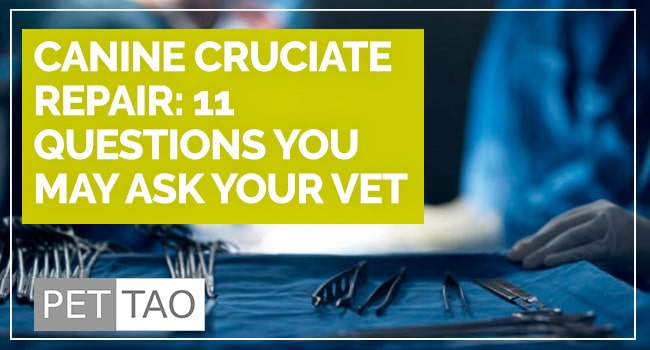Make the following considerations before making your decision.
Question #1: What is the cost for cruciate ligament repair in my dog?
The cost of surgical cruciate repair varies by geography and individual surgeon. Expect to pay in the range of $1800-$4000.
Just how much you’ll have to spend depends on the surgical procedure performed and whether or not the surgeon is board certified.
Question #2: Without surgery, will my dog’s cruciate ligament repair itself?
Small dogs (less than 25 lbs.) generally recover without surgery.
Unfortunately, larger dogs generally require surgery. The ligament will not usually heal on its own.
But, many dogs will adapt to the injury. Predicting which dogs will adapt to the injury is impossible.
Question #3: What is the recovery after cranial cruciate ligament repair?
Immediately following surgery, your dog will be in a modest amount of pain. Expect swelling and bruising for 7-10 days following the procedure.
Expect some weight-bearing 14 days after surgery with progressive improvement over a three to four-month period.
Full recovery takes approximately four months.
A reasonable expectation is a return to 90% of full function.
Some dogs may not return to 90% of full function if severe arthritis is present.
Question #4: Is the ACL in dogs just like the ACL in my knee?
Functionally, the dog and human ACL are roughly the same.
Both functions to stabilize the knee.
However, the way in which each ligament tears is different.
In people, ACL tears are usually the result of blunt trauma or abnormal forces directed to the knee.
In dogs, the ACL becomes damaged as the ligament progressively deteriorates.
Question #5: What are the best supplements for a dog’s cranial cruciate ligament?
Any joint-lubricating supplement is beneficial.
Common supplements contain chondroitin, glucosamine, and green-lipped mussel.
Pharmaceutical drugs commonly used are NSAIDs, joint modifiers like Adequan, and hyaluronic acid.
Eastern herbals such as the Tendon-Ligament formula are frequently beneficial.
Question #6: When my dog has a cruciate ligament tear, how can I prevent the other knee from suffering the same injury?
The most important thing to address is your pet’s weight.
Obese dogs will more than likely tear the ligament on the other side.
Slender dogs have a much better chance of not tearing the other ligament. Prolotherapy can be beneficial as a prevention strategy.
Question #7: After surgery of the cranial cruciate ligament, will my dog still have to take medicine?
Frequently, because of arthritis, many dogs must continue some sort of medicine or supplementation to suppress signs of arthritis.
Question #8: After surgery for a torn ligament, what are the chances for a full recovery?
I tell clients to expect a return to 90% of full function unless significant arthritis has already developed.
With arthritis, the percentage can significantly decline.
Question #9: After a diagnosis, how long can I wait to have surgery?
The sooner surgery is performed after injury the better.
Waiting only allows the progression of arthritis.
I have seen owners wait six months after the injury before requesting surgery.
Many dogs have recovered uneventfully.
Question #10: How do I choose the best surgeon?
Tough question!
Many general veterinarians frequently perform cruciate surgeries and have developed the necessary skill to perform the surgeries expertly.
However, some owners prefer a board-certified surgeon.
You should interview your general veterinarian in order to decide which surgeon is best for your situation.
Educate yourself, explore your options.
Powerful Tools to Help Your Dog’s Ligament Challenges
There are many quick and easy changes you can make at home to help you give your dog an edge on easing tendon and ligament challenges.
- Learn more about torn ligaments and cruciate disease.
- Provide joint support. PET | TAO Harmonize Joint is a blend of Eastern herbs and Western supplements working together to lubricate and restore your dog’s joints.
- Ease your dog’s discomfort naturally. PET | TAO Comfort is a blend of Eastern herbs and Western supplements to soothe your dog’s arthritic challenges to make him/her more comfortable.
- Try PET | TAO Freeze Dried Beef Liver Treats. According to TCVM, liver controls tendons and ligaments. As few as 5-6 treats per day can make a huge difference in your dog’s tendon and ligament health!
- Try a Blood-building TCVM Diet. PET | TAO Zing dog food builds Blood. According to TCVM, Blood deficiency leads to ligament tears.
- Learn more about TCVM Herbal Remedies. Chinese medicine offers many amazing natural solutions for ligament and cruciate challenges. Some good examples are:








